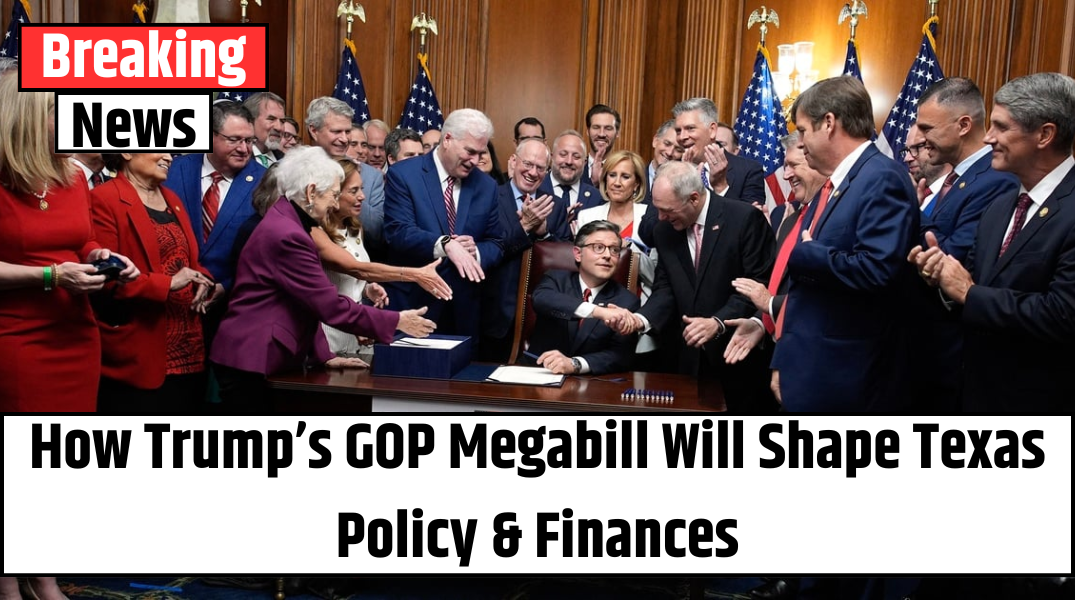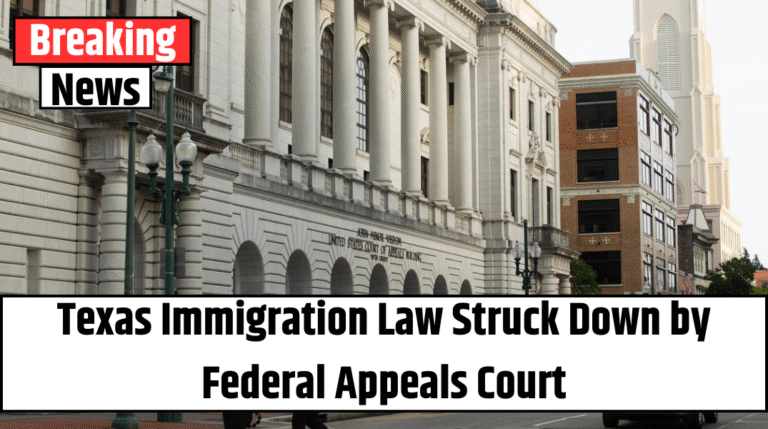How Trump’s GOP Megabill Will Shape Texas Policy & Finances
After months of political wrangling and last-minute deals, a far-reaching Republican tax and spending bill has cleared Congress and is headed to President Donald Trump’s desk for signature. The legislation marks a defining moment for the Trump administration’s second-term agenda, with massive overhauls across health care, tax policy, immigration, and more. Texans, in particular, will feel the ripple effects for years to come.
Health Care Overhaul Hits Texas Hard
Among the most contentious provisions is a drastic reshaping of Medicaid and Affordable Care Act (ACA) subsidies. The changes are expected to result in over 1.7 million Texans losing health coverage.
Starting in 2027, Medicaid funding for Texas will shrink by an estimated $39 billion over a decade, based on projections from the Congressional Budget Office and the Kaiser Family Foundation (KFF). With more than 4 million Texans relying on Medicaid — especially in rural regions and the Rio Grande Valley — experts warn the cuts will be particularly severe.
The legislation also ends enhanced ACA subsidies from the Biden era, disproportionately affecting Texas, which has the nation’s highest uninsured rate and is one of 10 states that never expanded Medicaid.
Further complicating access, the bill introduces mandatory work requirements for most Medicaid recipients aged 19 to 64. Texas will need to implement and oversee these new regulations — a costly administrative burden.
Rep. Marc Veasey (D-Fort Worth) called the bill a looming “health care disaster” that threatens both urban and rural hospitals. Republicans, however, argue that the reforms ensure assistance reaches those who truly need it.
Changes to SNAP and Food Aid
The legislation also revises the Supplemental Nutrition Assistance Program (SNAP), potentially cutting benefits and increasing administrative costs for Texas.
Also Read – Friendswood Police Arrest Suspect After Vehicle Prowling Report
States with high rates of over- or underpayments in SNAP distributions will now be responsible for a portion of those benefits. With an 8.3% error rate in 2024, Texas would have owed around $716 million annually if the policy had been active.
Texas will also have to absorb 75% of SNAP administrative costs, up from 50%, adding an $89.5 million yearly expense, according to Feeding Texas.
Work requirements for food aid have also tightened. Now, able-bodied adults up to 65 — even those with teenage children — must work 80 hours per month to qualify.
Border Enforcement and Immigration Spending
For Texas Republicans, the bill delivers a major victory in the form of $13.5 billion in federal reimbursements for border enforcement — much of it directed at Operation Lone Star, Gov. Greg Abbott’s controversial initiative to secure the U.S.-Mexico border.
The measure also includes $30 billion for ICE to expand staffing and equipment and billions more for surveillance technology and renewed border wall construction, aligning with Trump’s immigration platform.
Rollback of Clean Energy Incentives
The bill walks back several core provisions of the Inflation Reduction Act, notably tax incentives for clean energy. Projects must now be operational by the end of 2027 — or begin construction within a year of the law’s passage — to qualify for credits.
Rep. Chip Roy (R-Austin) praised the move, criticizing wind and solar energy as unreliable. Advocates argue the rollback will cost Texas jobs and slow the growth of its renewable energy sector at a time of rising energy demand.
Tax Breaks Extended — With Benefits Skewed to the Wealthy
The heart of the bill makes permanent the tax cuts from Trump’s 2017 legislation, preventing them from expiring at year’s end. While this will offer continued relief to many, analysts say the wealthiest Texans will benefit most.
Also Read – Kemah’s Trump Burger Files Lawsuit, Accuses Landlord of Illegally Seizing Location
According to the Institute on Taxation and Economic Policy, the top 1% in Texas — earning over $806,800 — will see average savings of $114,680 annually, more than their counterparts in nearly every other state.
New temporary deductions were also included, such as:
-
$25,000 write-off for tipped workers (through 2028)
-
$12,500 deduction for overtime pay
-
$6,000 extra standard deduction for seniors
New ‘Trump Accounts’ for Newborns
A unique addition to the bill is the creation of “Trump accounts,” championed by Sen. Ted Cruz. Starting in 2025, nearly every newborn will receive a $1,000 government-seeded investment account, which can grow tax-deferred and be used for education, housing, or business startup costs.
With additional contributions allowed up to $5,000 per year, Cruz says the program offers young Americans a stake in the economy.
Pell Grants Spared — But with Caveats
Proposals to tighten eligibility for Pell Grants — a lifeline for low-income college students — were removed from the final version after pushback. However, the bill bars Pell aid for students at schools that already cover full tuition, affecting some Texas “promise” programs.
Pell Grants will now be available for short-term training programs, offering flexibility for students pursuing workforce credentials.
Tax Incentives for K-12 Scholarships
Cruz also secured scaled-back tax credits for donations to nonprofits that fund K-12 scholarships, often used for private school tuition. The credit is capped at $1,700 annually, and states must opt in — setting the stage for future state-level fights over public funding and school choice.
Houston Gets a Boost from NASA Funds
Lastly, Sen. John Cornyn won a provision requiring NASA to consider relocating the Space Shuttle Discovery to Houston’s Johnson Space Center — reversing a decade-old decision. He also secured $10 billion for space exploration programs, including Artemis missions to the Moon and Mars.
Also Read – 9-Year-Old Girl Dies in Hot Car; Mother Detained at Galena Park Job Site
In Summary:
This massive legislation reshapes federal policy across the board — and Texas will feel the brunt of both the benefits and the costs. While tax breaks and border funding may appeal to many residents, the cuts to health care and food aid, combined with energy rollbacks, are raising red flags across the state.







